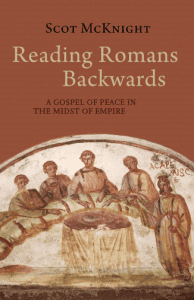 My lecture notes on the Weak and Strong, now written up in Reading Romans Backwards, or as a friend said to me, “Reading Romans in Reverse.”
My lecture notes on the Weak and Strong, now written up in Reading Romans Backwards, or as a friend said to me, “Reading Romans in Reverse.”
Free Study Guide “Teaching Romans Backwards” by Becky Castle Miller
Weak and Strong in Rome
The Weak
- The Weak are Jewish believers who are in the stream of God’s election and need to be affirmed in their election,
- but who have questions about the faithfulness of God to that election
- and who need to embrace the surprising moves of God throughout Israel’s history.
- The Weak know the Torah, practice the Torah,
- but in the person of The Judge sit in judgment on gentiles, especially the Strong in the Christian community in Rome, even though they have no status or privilege or power.
- Furthermore, the Weak are tempted to resist paying taxes to Rome on the basis of the Jewish zealotry tradition.
- In addition, the Weak – in the face of The Judge – need to apply “faith in Christ” more radically to themselves, so discovering that they are a new example of the “remnant” of Israel, and they need to see that the sufficiency of faith means that gentile believers in Christ are siblings so they see that Torah observance is not the way of transformation for either themselves or the Strong in Rome.
The Strong
- The Strong are predominately gentiles who believe in Jesus as Messiah or king,
- who do not observe Torah as the will of God for them
- and who have condescending and despising attitudes probably toward Jews but especially to Jewish believers in Jesus,
- and all of this is wrapped up in the superior higher status of the Strong in Rome.
- Paul and Jewish believers who embrace the non-necessity of Torah observance are at least at times among the Strong in their theological convictions about Torah observance as the way of Christoformity.
- But the Strong are taking advantage of their superior social status to denigrate the Torah and holiness as the quest of the Christians in Rome, and so they are coercing the Weak into table fellowship over non-kosher food.
- The Strong then are as known for their position on observance of Torah and for their status as they are for ethnicity.











